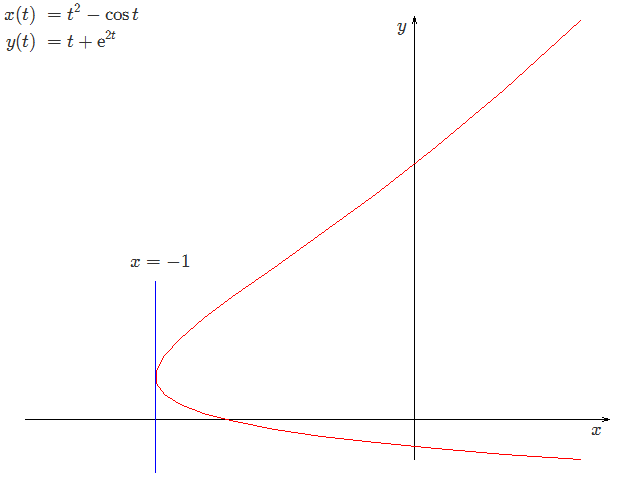Parametric Differentiation
Definition
Suppose a 2D curve is defined parametrically, where $x=x(t)$ and $y=y(t)$. Then, provided that $\frac{\mathrm{d} x}{\mathrm{d} t}\neq0$, the derivative of $y$ with respect to $x$ is given by:
\[\frac{\mathrm{d} y}{\mathrm{d} x}=\frac{^{\Large{\mathrm{d} y} }/_{\Large{\mathrm{d} t} } }{^{\Large{\mathrm{d} x} }/_{\Large{\mathrm{d} t} } }.\]
This result is derived by using the chain rule, $\dfrac{\mathrm{d} y}{\mathrm{d} t}=\dfrac{\mathrm{d} y}{\mathrm{d} x}\dfrac{\mathrm{d} x}{\mathrm{d} t},$ and dividing through by $\dfrac{\mathrm{d} x}{\mathrm{d} t}$.
Worked Example
Example 1
Consider the parametrically defined function $x(t)=t^2-\cos{t};\: y(t)=t+\mathrm{e}^{\large{2t} }$. Find $\dfrac{\mathrm{d} y}{\mathrm{d} x}$, and find the point where $\dfrac{\mathrm{d} y}{\mathrm{d} x}$ is not defined.
Solution
Recall that $\dfrac{\mathrm{d} y}{\mathrm{d} x}=\dfrac{^{\Large{\mathrm{d} y} }/_{\Large{\mathrm{d} t} } }{^{\Large{\mathrm{d} x} }/_{\Large{\mathrm{d} t} } }.$
The derivative of $y$ with respect to $t$ (found using standard derivatives) is:
\begin{align} \dfrac{\mathrm{d} y}{\mathrm{d} t} &= \dfrac{\mathrm{d} }{\mathrm{d} t}\bigl[t+\mathrm{e}^{\large{2t} }\bigl] \\ &= 1+2\mathrm{e}^{\large{2t} }. \end{align}
The derivative of $x$ with respect to $t$ is:
\begin{align} \dfrac{\mathrm{d} x}{\mathrm{d} t} &= \dfrac{\mathrm{d} }{\mathrm{d} t}\bigl[t^2-\cos{t}\bigl] \\ &= 2t-(-\sin{t}) \\ &= 2t+\sin{t}. \end{align}
The derivative $\dfrac{\mathrm{d} y}{\mathrm{d} x}$ is therefore:
\begin{align} \dfrac{\mathrm{d} y}{\mathrm{d} x} &= \dfrac{^{\Large{\mathrm{d} y} }/_{\Large{\mathrm{d} t} } }{^{\Large{\mathrm{d} x} }/_{\Large{\mathrm{d} t} } } \\ &= \dfrac{1+2\mathrm{e}^{\large{2t} } }{2t+\sin{t} }. \end{align}
The point where $\dfrac{\mathrm{d} y}{\mathrm{d} x}$ is not defined is the point where $\dfrac{\mathrm{d} x}{\mathrm{d} t}=0$, since this would give $\dfrac{\mathrm{d} y}{\mathrm{d} x}=\dfrac{^{\Large{\mathrm{d} y} }/_{\Large{\mathrm{d} t} } }{0}$, which is clearly undefined.
Here $\dfrac{\mathrm{d} x}{\mathrm{d} t}=2t+\sin{t}$, so $\dfrac{\mathrm{d} y}{\mathrm{d} x}$ is undefined where $2t+\sin{t}=0,$. This equation holds at $t=0$ (since $\sin{0}=0)$.
The value of $x$ where $t=0$ is:
\[x(0)=0^2-\cos{0}=-1.\]
The value of $y$ where $t=0$ is:
\[y(0)=0+\mathrm{e}^0=1.\]
Hence $\dfrac{\mathrm{d} y}{\mathrm{d} x}$ is undefined at the point $(-1,1)$.
The following graph shows the given parametric curve and the line tangent to the curve at the point $(-1,1)$, where the gradient is undefined.

|250px
Video Examples
Example 1
Prof. Robin Johnson finds $\dfrac{\mathrm{d} y}{\mathrm{d} x}$ given a parametrically defined function $x(t)=2t-\cos{t}$; $y(t)=t^2+\sin{t}$.
Example 2
Prof. Robin Johnson finds $\dfrac{\mathrm{d} y}{\mathrm{d} x}$ and $\dfrac{\mathrm{d} ^2y}{\mathrm{d} x^2}$ given a parametrically defined function $x(t)=2t^2+t$; $y(t)=t^3-t$.
Workbook
This workbook produced by HELM is a good revision aid, containing key points for revision and many worked examples.
External Resources
- Parametric differentiation workbook at mathcentre.